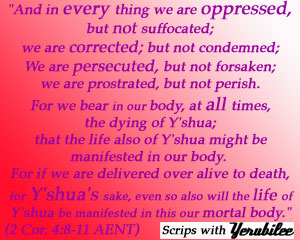“Therefore let us also, who have all these witnesses surrounding us like clouds, cast from us all encumbrances and sin which is always prepared for us; and let us run with patience the race that is appointed for us.” (Hebrews 12:1 AENT pg.424).
Notice here how we are encouraged to remove ourselves not only from sin, but ALSO from “encumbrances.”
Encumbrances must be somehow different from “sin:” Why else would the writer distinguish the two using the separator “and?” Therefore, we can improve our Race by removing (1) sin and (2) encumbrances from our lives. Here we will focus on #2. However, the NT definition of sin may surprise you: Check here and here.
Back to “encumbrances:” Are there things in your life which slow down your race, even if they’re not firmly in the “sin” category? Take a moment and prayerfully consider this.
Chocolate may not qualify as sin, but it could be an encumbrance; caffeine and alcohol are arguably in this same category. With what reading material do we fill our minds? Which TV shows, movies, music do we allow past the gates of our eyes & ears? Which relationships hinder our walk, and which friends exhort us higher? Our expenditures of time, money, and resources: Are these an encumbrance to our race? It is up to the individual to decide for themselves.
Consider the witnesses who surround us who are mentioned in the previous chapter: Hebrews 11. Consider the shortness of this present life compared with eternity. Are we really running our race with patience, efficiency, with a goal to actually win?
Don’t you know that they who run in the stadium, run all of them; yet it is one who gains the victory. You run so as to attain. 25. For everyone who engages in the contest restrains his desires in everything. And they run to obtain a crown that perishes; but we, one that does not perish. 26. I therefore so run, not as for something unknown; and I so struggle, not as struggling against air; 27. But I subdue my body, and reduce it to servitude; lest, when I have preached to others, I myself should despise myself. (1 Corinthians 9:24-27 AENT pg.514.)
May the Messiah Y’shua bless your race.
Teddy,
Yerubilee
Do you find the translation of these NT verses to be attractive? They have been translated into English directly from the Aramaic–the language spoken by Messiah Y’shua. More info at the link below:
P.S. The Aramaic-speaking Syrian church has always known without a doubt that the writer of the Letter to the Hebrews was Paul the Apostle. This fact was only debated in the West, never in the East.










